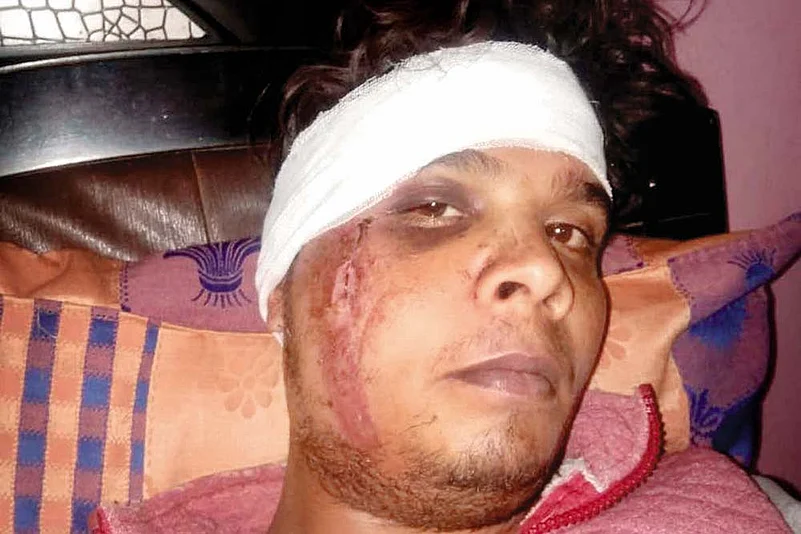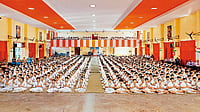What the communal riots in Delhi have left behind are not just a list of casualties, a litany of woes or charred ruins. What lies trampled underfoot is common decency of people and the taken-for-granted trust that holds communities and lives together. These riot victims had their lives fractured, some beyond repair. A year on, a few of them try to cope with iron resolve and an expectation of ‘justice’. Others straggle on painfully, with reduced reserves of goodwill and hope in their souls.

Through A Mirror Broken
A year after the deadly disruption of the Delhi riots, 52-year-old Mohammed Wakeel has been picking up the scattered pieces of his life. On February 14, Wakeel and his family moved into their reconstructed house in Northeast Delhi’s Shiv Vihar. Their old home was vandalised, then torched, in the riots that killed 53 people and injured hundreds. A distraught Wakeel recalls how his world plunged into darkness when a bloodthirsty mob threw acid on his face that left him blind. It was the beginning of a Golgotha for Wakeel, who used to run a grocery store in Shiv Vihar, an epicentre of the bloodshed. On that day, as a violent mob raged, Wakeel was looking down from the balcony to find a safe exit for his children and wife. “It was dark; suddenly, someone threw acid on my face and body. It all happened in seconds,” Wakeel says.
ALSO READ: The Case Diary
They found refuge in the nearby Madina Majid which, too, wasn’t spared. “They torched and looted the masjid. Scared for our lives, I suffered excruciating pain in silence. We had to wait till 4 in the morning to go to a hospital,” he says. Though the Delhi government has provided compensation for Waqeel’s treatment, there is little hope. “I have lost the most precious thing in life,” he despairs. Though their house was burnt and looted, Wakeel’s wife Mumtaz Begum says that they haven’t lodged a complaint. “We don’t harbour anger or contempt for anyone” she says simply. The police, too, looked the other way.
With NGOs pitching in for the rebuilding of their house and shop, the family is getting life back on track, she says. The one sediment the riots left behind are the new iron gates straddling the thickly populated lanes of Shiv Vihar, meant, ostensibly, to bar ‘outsiders’. In a mixed neighbourhood of Muslims and Hindus, what troubles the family most is the mistrust that the traumatic events have spawned. “The mohabbat between Hindus and Muslims is gone. We don’t even talk to each other. When all this happened, no help came from our Hindu neighbours,” says Mumtaz.

The Day Friends Turned Foes
Till last year, Bhai Sahab, aka Lala, used to hang around mostly with Muslim friends in his locality, close to Mustafabad in Northeast Delhi. That was then, across a gulf of time, suffering and suspicion. Everything changed since February 24 last year, after riots came to the area. Though tensions were running high in the locality that day on account of the communal conflict elsewhere in Delhi, Sahab and his friends were confident enough to venture out in their old stomping grounds. It was a rude shock, then, to Sahab after he and his friends were brutally beaten up by acquaintances and friends in the neighbourhood. “We were beaten up so badly that they thought that I am dead. I was bleeding profusely and lay unconscious for two hours,” says the 27-year-old.

Sahab says that though he has filed a case against 15 people he knows who were behind the crime, the police are yet to take action. “The perpetrators have bribed the police. So they haven’t been arrested yet,” he says. Inevitably, the attack has impacted his livelihood, says Sahab, who drives a taxi in Gurgaon. “I only got Rs 5000 as compensation,” he says.
He says the riots have created a trust deficit among Hindu and Muslim communities. “Earlier, Muslims and Hindus used to be good friends, but now no one trusts the other. I am afraid to go out with them.”

Living On In The Embers Of Trauma
A year after the riots, 42-year-old Mohammed Anish patiently weaves a new start to his life. “I consider myself lucky that our lives have been saved,” says Anish, who lost his house, shop, and belongings in the maelstrom of violence. Anish and his wife is yet to recover from the shock of the mayhem they witnessed on the evening of February 25, when fear, panic, then havoc ransacked the streets of Shiv Vihar, where he has spent 30 years of his life. Houses were torched and plundered, rioters and their prey ran amok, he remembers with a shudder.
ALSO READ: ‘Delhi Police Is 200 Per Cent Impartial’
“The street was burning. The mob used gas cylinders to blow up all houses in the area. It still turns my blood cold,” says Anish, a plumber. Though Anish and his family took refuge with a relative, they were in for a shock when they returned after three days. “There was nothing left. My shop and house were looted and burnt down. My life’s savings were reduced to dust and smoke,” he says.
The family moved to a rented accommodation after spending a month in a relief camp built by the Delhi government. With the pandemic-induced disruption dealing another blow to riot victims, challenges kept mounting, he says. “I have been out of work for almost a year. Though the government promised compensation, we are yet to get anything. Had it not been for NGOs, we would have been dead by now,” says Anish. Though his house and shop are being rebuilt with the help of an NGO, Anish says that his wife and children are still not ready to return. “My family is yet to come out of the trauma. Our life is still not back on track.”

A Long, Festering Wound
Last year’s Diwali broke dark and joyless for Shaukat Ali, who missed the company of his neighbourhood friends in Northeast Delhi’s Babu Nagar. “Last year’s riots have cast a shadow on festivals. Earlier, we used to celebrate together with Hindu friends. I have lost my childhood friends. There is no communication between the two communities now,” says the 48-year-old. “Wounds in the mind and body are deep, and it will take long to heal,” says Shaukat, who survived a bullet wound during the sporadic violence that shook the area.
ALSO READ: Sedition: A Minatory Frown
Shaukat was hit by a bullet on the evening of February 25, while returning from his sister-in-law’s place close by. “I felt something hit my left thigh and fell unconscious. I woke up at the hospital,” says the father of three. Shoddy medical treatment at the Lok Nayak Jai Prakash (LNJP) Hospital made the recovery process slow, he says. “After removing the bullet, the doctor didn’t even stitch the wound,” he alleges. “The Delhi government gave a paltry Rs 20,000 as compensation, whereas I had to spend lakhs for the treatment.”
The injury has derailed his work too, says Shaukat, a casual worker with water cooler plants. As his job involves hard labour, he now has shifted to Bijnor in search of job prospects. “Because of the injury, I can’t work like before. I am the breadwinner of the family and I have three college-going children,” he says.

He Offered To Protect Others From Danger
“My son would have turned 23 on March 3,” sighs Agaaz Hussain, father of Ashfaq, who was killed during the Northeast Delhi riots. While rummaging through Ashfaq’s belongings the other day, his father stumbled upon a music card that Ashfaq made for his friend Amir. “My son was good at everything. He was into music; he had a Youtube channel,” says Hussain, fighting back tears. Ashfaq, who ran an electrical shop in Chand Bagh, married on Valentine’s Day 2020; eleven days later, his life was snuffed out.
ALSO READ: Suffering By Default
Life has been altered inextricably, says Ashfaq’s mother. Her son, she recalls, had gone to work after he received a call on February 25. “We asked him not to go that day.” Later, the family was informed that Ashfaq was killed in Brijpuri, not far from his home in Mustafabad. “He was dead by the time we reached the hospital. Doctors told us that he was shot. But the FIR says he was beaten up,” says the grieving father. Though the family received compensation, it was claimed by his wife, as per rules. “His wife lives with her parents. I only pray that my son’s soul rests in peace. Nothing can replace his loss,” says Agaaz, a vegetable vendor. He remembers with sad irony how Ashfaq went around, as the atmosphere became taut with tension, asking people not to venture out. “It was the day he died. Before leaving for work, he asked everyone to be alert and to contact him if they needed anything.”
Yet Agaaz dissents with the view that the riots have opened faultlines between the communities. “It was mostly Hindus who came to my house to grieve my son’s death. There is no difference between Hindus or Muslims. It’s the enemies of the country who are creating trouble,” he says. Though Agaaz is in the dark about the police probe, he wants justice for his son. “I am sure my son will get justice,” he says firmly. Ashfaq’s elder brother Abbas doesn’t share his optimism. “Though the doctors have told us that he was shot dead, the narrative has changed. I have no trust in the system,” he says.

Memories Of Orphans
Seven-month-old Alima giggles, and gurgles, in mother Shabeena’s lap, oblivious of her unbearable pain. Crying softly, Shabeena laments that the infant will never meet her father Amir Ali, who was killed in the riots before she was born. As Delhi marks the first anniversary of the communal riots, Shabeena thinks about Amir, 30, a taxi-driver and his brother Hashim,19, a tailor, who were killed by a violent mob in Northeast Delhi’s Mustafabad. Yet, the storm broke without warning—when Ali and Hashim left home to meet their ailing grandmother in Ghaziabad, no portent had troubled Shabeena, six months pregnant then, that she might never see them again. It was three days before the riots began.
The couple’s other children, Alpisha, 6, and Anisha, 5, have come to terms with their loss. “Now they understand that Abba won’t come back,” says Shabeena. A year has done little to console Amir’s father Babu Khan. He says he relives the memories of his sons through the grandchildren. “No parent can bear the loss of two children. The grandchildren are my only solace,” says the 60-year-old. A familiar mixture of disbelief and horror colours his emotions: Hindus and Muslims have been living cheek-by-jowl for decades here; that this has happened is unthinkable. With nagging health issues and a large, extended family to fend for, Babu stares at a limbo. Compensation from the Delhi government can only go so far. “I thought my children will support me at my old age,” he murmurs. Their mother Asghari repeats the fact that when her sons called her last on February 26, they were only five minutes away from home. “The police fished out their bodies from a nearby drain. We have not been able to sleep for a year now,” she mumbles between sobs. Babu says the sight of his sons’ bruised, lacerated bodies at the hospital haunts him still. “We need justice,” he says firmly.
Text by Preetha Nair. Photographs by Suresh K. Pandey


























